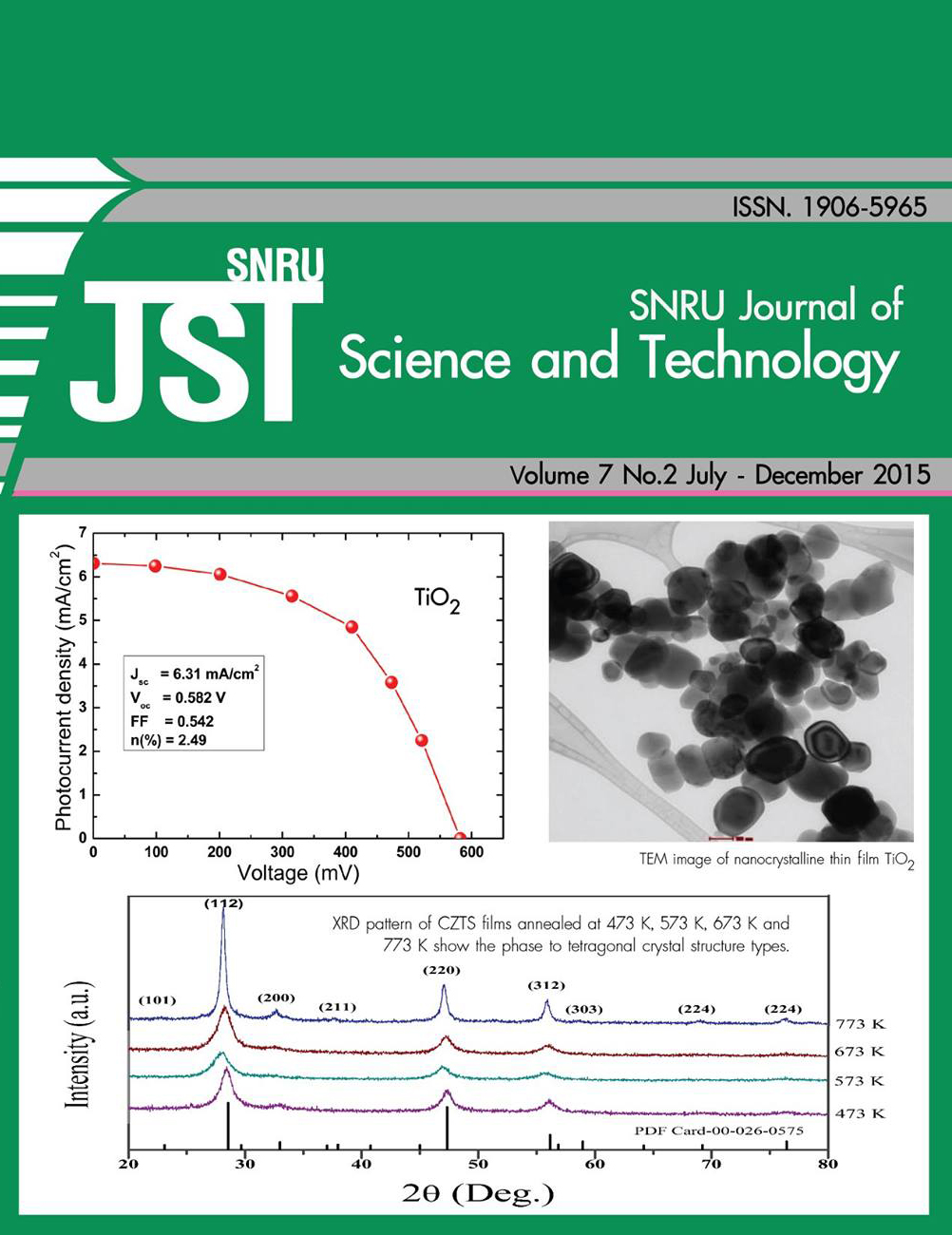กระบวนการเสริมสร้างต้นทุนชีวิตด้านพลังเพื่อนและกิจกรรมของนักศึกษา Reinforcement to enhance life assets (positive youth development) from peers and activity-based process
Keywords:
ต้นทุนชีวิต, พลังเพื่อน, กระบวนการเสริมสร้างต้นทุนชีวิตAbstract
การพัฒนาต้นทุนชีวิตด้านพลังเพื่อนและกิจกรรมมีความสำคัญที่จะช่วยให้นักศึกษาซึ่งมีอิสระในการใช้ชีวิตเกิดความรู้สึกมั่นคงและควบคุมการกระทำให้อยู่ในกรอบกติกาของสถานศึกษาได้ ดังนั้นการวิจัยนี้มีวัตถุประสงค์เพื่อศึกษากระบวนการเสริมสร้างต้นทุนชีวิตด้านพลังเพื่อนและกิจกรรมของนักศึกษา กลุ่มตัวอย่าง ได้แก่ นักศึกษาสาขาวิชาวิทยาศาสตร์สุขภาพ ชั้นปีที่ 1 ที่ลงทะเบียนเรียนในภาคเรียนที่ 2/2556 มีคะแนนต้นทุนชีวิตด้านพลังเพื่อนและกิจกรรมอยู่ในระดับค่อนข้างน้อยและสมัครใจเข้าร่วมการวิจัย จำนวน 39 คน เก็บรวบรวมข้อมูลโดยใช้แบบบันทึกกิจกรรมและการสังเกตการณ์มีส่วนร่วม วิเคราะห์ข้อมูลเชิงเนื้อหา การสะท้อนตนเอง และถอดบทเรียนหลังร่วมกิจกรรม เปรียบเทียบความแตกต่างของต้นทุนชีวิตของกลุ่มตัวอย่างก่อนและหลังเข้าร่วมกิจกรรม โดยใช้สถิติ paired t- test ผลการวิจัยพบว่ากระบวนการเสริมสร้างต้นทุนชีวิตด้านพลังเพื่อนและกิจกรรมของนักศึกษา ประกอบด้วย 3 ขั้นตอน ได้แก่ 1) การวิเคราะห์เหตุการณ์ในอดีต พบว่าส่วนใหญ่มีความคิดเห็นว่าการทำงานในหมู่คณะขาดความร่วมมือ งานล่าช้า เพื่อนในชั้นปีไม่กล้าแสดงความคิดเห็น และมีการแบ่งพรรคแบ่งพวก 2) การวิเคราะห์เหตุการณ์ในปัจจุบัน พบว่าเพื่อนไม่มีเหตุผล ขาดความเข้าใจเพื่อนคนอื่น ขาดความสามัคคี และมาเรียนสาย ส่งงานช้า และ 3) การสร้างแผนปฏิบัติการไปสู่อนาคตร่วมกัน พบว่า ส่วนใหญ่คาดหวังอยากเห็นชั้นเรียนของตนเองมีความสามัคคี ช่วยเหลือกัน ให้ความร่วมมือในการทำกิจกรรม มีความรับผิดชอบ และ ต้องการให้เพื่อนรับฟังความเห็นของผู้อื่น ถอดบทเรียนหลังร่วมกระบวนการเสริมสร้างต้นทุนชีวิต ส่วนใหญ่มั่นใจว่าตนเองสามารถพัฒนาและปรับปรุงตนได้ มีความพึงพอใจในกระบวนการเสริมสร้างต้นทุนชีวิตด้านพลังเพื่อนและกิจกรรมอยู่ในระดับมาก ผลการเปรียบเทียบคะแนนต้นทุนชีวิตก่อนและหลังเข้าร่วมกิจกรรมเสริมสร้างต้นทุนชีวิตแตกต่างกันอย่างมีนัยสำคัญทางสถิติที่ระดับ .05
(p–value < 0.001)
The development of life assets (positive youth development) from peers and activity-based process among students is important to help independent students feel secured and follow school regulations and rules. Thus, this research aimed to examine the processes that enhance life assets from peers and activities among students. The 39 volunteer samples were first year university students majoring in health science, enrolled in the second semester of the 2013 academic year, and with low levels of the life assets. Data collection was done through activity written records, and participatory observation. Content analysis, self-refection, and focus group discussion were employed for further comparing the samples’ life assets before and after the intervention, using the paired t- test. The results revealed that reinforcement to enhance life assets (positive youth development) from peers and activity-based process among student consisted of three stages. The first stage was Past-Analysis Stage, which found that the majority of the students agreed that having limited cooperation and participation if working in a team, late work submission, no expression or opinion among cohorts, and partisanship. The second was Present-Analysis Stage, which revealed that peers were unreasonable, unharmonious with others, lacked understanding of others, late for assignment submission, and late for class. The final stage was the creation of a Plan for the Future, which combined all stages. A majority of the students expected their classmate to cooperate, help each other, participate in school activities, take responsibility, and listen to peers’ opinions. After the intervention, most of students were able to develop and improve themselves, and had a level of satisfaction towards the process. The results from the comparison of the students’ life assets before and after the intervention revealed that the participants demonstrated statistical significance at .05 (p-value < 0.001).









